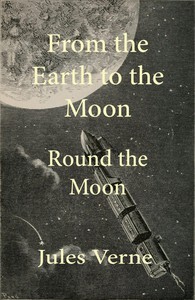The Moon-Voyage by Jules Verne (mobi ebook reader .txt) 📖

- Author: Jules Verne
Book online «The Moon-Voyage by Jules Verne (mobi ebook reader .txt) 📖». Author Jules Verne
"I should like to see the first spadeful turned up," said the president.
"And I the last!" exclaimed J.T. Maston.
"We shall manage it, gentlemen," answered the engineer; "and, believe me, the Goldspring Company will not have to pay you any forfeit for delay."
"Faith! it had better not," replied J.T. Maston; "a hundred dollars a day till the moon presents herself in the same conditions—that is to say, for eighteen years and eleven days—do you know that would make 658,000 dollars?"
"No, sir, we do not know, and we shall not need to learn."
About ten a.m. the little troop had journeyed about twelve miles; to the fertile country succeeded a forest region. There were the most varied perfumes in tropical profusion. The almost impenetrable forests were made up of pomegranates, orange, citron, fig, olive, and apricot trees, bananas, huge vines, the blossoms and fruit of which rivalled each other in colour and perfume. Under the perfumed shade of these magnificent trees sang and fluttered a world of brilliantly-coloured birds, amongst which the crab-eater deserved a jewel casket, worthy of its feathered gems, for a nest.
J.T. Maston and the major could not pass through such opulent nature without admiring its splendid beauty.
But President Barbicane, who thought little of these marvels, was in a hurry to hasten onwards; this country, so fertile, displeased him by its very fertility; without being otherwise hydropical, he felt water under his feet, and sought in vain the signs of incontestable aridity.
In the meantime they journeyed on. They were obliged to ford several rivers, and not without danger, for they were infested with alligators from fifteen to eighteen feet long. J.T. Maston threatened them boldly with his formidable hook, but he only succeeded in frightening the pelicans, phaetons, and teals that frequented the banks, while the red flamingoes looked on with a stupid stare.
At last these inhabitants of humid countries disappeared in their turn. The trees became smaller and more thinly scattered in smaller woods; some isolated groups stood amidst immense plains where ranged herds of startled deer.
"At last!" exclaimed Barbicane, rising in his stirrups. "Here is the region of pines."
"And savages," answered the major.
In fact, a few Seminoles appeared on the horizon. They moved about backwards and forwards on their fleet horses, brandishing long lances or firing their guns with a dull report. However, they confined themselves to these hostile demonstrations, which had no effect on Barbicane and his companions.
They were then in the middle of a rocky plain, a vast open space of several acres in extent which the sun covered with burning rays. It was formed by a wide elevation of the soil, and seemed to offer to the members of the Gun Club all the required conditions for the construction of their Columbiad.
"Halt!" cried Barbicane, stopping. "Has this place any name?"
"It is called Stony Hill," answered the Floridians.
Barbicane, without saying a word, dismounted, took his instruments, and began to fix his position with extreme precision. The little troop drawn up around him watched him in profound silence.
At that moment the sun passed the meridian. Barbicane, after an interval, rapidly noted the result of his observation, and said—
"This place is situated 1,800 feet above the sea level in lat. 27° 7' and West long. 5° 7' by the Washington meridian. It appears to me by its barren and rocky nature to offer every condition favourable to our enterprise; we will therefore raise our magazines, workshops, furnaces, and workmen's huts here, and it is from this very spot," said he, stamping upon it with his foot, "the summit of Stony Hill, that our projectile will start for the regions of the solar world!"
CHAPTER XIV. PICKAXE AND TROWEL.That same evening Barbicane and his companions returned to Tampa Town, and Murchison, the engineer, re-embarked on board the Tampico for New Orleans. He was to engage an army of workmen to bring back the greater part of the working-stock. The members of the Gun Club remained at Tampa Town in order to set on foot the preliminary work with the assistance of the inhabitants of the country.
Eight days after its departure the Tampico returned to the Espiritu-Santo Bay with a fleet of steamboats. Murchison had succeeded in getting together 1,500 workmen. In the evil days of slavery he would have lost his time and trouble; but since America, the land of liberty, has only contained freemen, they flock wherever they can get good pay. Now money was not wanting to the Gun Club; it offered a high rate of wages with considerable and proportionate perquisites. The workman enlisted for Florida could, once the work finished, depend upon a capital placed in his name in the bank of Baltimore.
Murchison had therefore only to pick and choose, and could be severe about the intelligence and skill of his workmen. He enrolled in his working legion the pick of mechanics, stokers, iron-founders, lime-burners, miners, brickmakers, and artisans of every sort, white or black without distinction of colour. Many of them brought their families with them. It was quite an emigration.
On the 31st of October, at 10 a.m., this troop landed on the quays of Tampa Town. The movement and activity which reigned in the little town that had thus doubled its population in a single day may be imagined. In fact, Tampa Town was enormously benefited by this enterprise of the Gun Club, not by the number of workmen who were immediately drafted to Stony Hill, but by the influx of curious idlers who converged by degrees from all points of the globe towards the Floridian peninsula.
During the first few days they were occupied in unloading the flotilla of the tools, machines, provisions, and a large number of plate iron houses made in pieces separately pieced and numbered. At the same time Barbicane laid the first sleepers of a railway fifteen miles long that was destined to unite Stony Hill and Tampa Town.
It is known how American railways are constructed, with capricious bends, bold slopes, steep hills, and deep valleys. They do not cost much and are not much in their way, only their trains run off or jump off as they please. The railway from Tampa Town to Stony Hill was but a trifle, and wanted neither much time nor much money for its construction.
Barbicane was the soul of this army of workmen who had come at his call. He animated them, communicated to them his ardour, enthusiasm, and conviction. He was everywhere at once, as if endowed with the gift of ubiquity, and always followed by J.T. Maston, his bluebottle fly. His practical mind invented a thousand things. With him there were no obstacles, difficulties, or embarrassment. He was as good a miner, mason, and mechanic as he was an artilleryman, having an answer to every question, and a solution to every problem. He corresponded actively with the Gun Club and the Goldspring Manufactory, and day and night the Tampico kept her steam up awaiting his orders in Hillisboro harbour.
Barbicane, on the 1st of November, left Tampa Town with a detachment of workmen, and the very next day a small town of workmen's houses rose round Stony Hill. They surrounded it with palisades, and from its movement and ardour it might soon have been taken for one of the great cities of the Union. Life was regulated at once and work began in perfect order.
Careful boring had established the nature of the ground, and digging was begun on November 4th. That day Barbicane called his foremen together and said to them—
"You all know, my friends, why I have called you together in this part of Florida. We want to cast a cannon nine feet in diameter, six feet thick, and with a stone revetment nineteen and a half feet thick; we therefore want a well 60 feet wide and 900 feet deep. This large work must be terminated in nine months. You have, therefore, 2,543,400 cubic feet of soil to dig out in 255 days—that is to say, 10,000 cubic feet a day. That would offer no difficulty if you had plenty of elbow-room, but as you will only have a limited space it will be more trouble. Nevertheless as the work must be done it will be done, and I depend upon your courage as much as upon your skill."
At 8 a.m. the first spadeful was dug out of the Floridian soil, and from that moment this useful tool did not stop idle a moment in the hands of the miner. The gangs relieved each other every three hours.
Besides, although the work was colossal it did not exceed the limit of human capability. Far from that. How many works of much greater difficulty, and in which the elements had to be more directly contended against, had been brought to a successful termination! Suffice it to mention the well of Father Joseph, made near Cairo by the Sultan Saladin at an epoch when machines had not yet appeared to increase the strength of man a hundredfold, and which goes down to the level of the Nile itself at a depth of 300 feet! And that other well dug at Coblentz by the Margrave Jean of Baden, 600 feet deep! All that was needed was a triple depth and a double width, which made the boring easier. There was not one foreman or workman who doubted about the success of the operation.
An important decision taken by Murchison and approved of by Barbicane accelerated the work. An article in the contract decided that the Columbiad should be hooped with wrought-iron—a useless precaution, for the cannon could evidently do without hoops. This clause was therefore given up. Hence a great economy of time, for they could then employ the new system of boring now used for digging wells, by which the masonry is done at the same time as the boring. Thanks to this very simple operation they were not obliged to prop up the ground; the wall kept it up and went down by its own weight.
This manoeuvre was only to begin when the spade should have reached the solid part of the ground.
On the 4th of November fifty workmen began to dig in the very centre of the inclosure surrounded by palisades—that is to say, the top of Stony Hill—a circular hole sixty feet wide.
The spade first turned up a sort of black soil six inches deep, which it soon carried away. To this soil succeeded two feet of fine sand, which was carefully taken out, as it was to be used for the casting.
After this sand white clay appeared, similar to English chalk, and which was four feet thick.
Then the pickaxes rang upon the hard layer, a species of rock formed by very dry petrified shells. At that point the hole was six and a half feet deep, and the masonry was begun.
At the bottom of that excavation they made an oak wheel, a sort of circle strongly bolted and of enormous strength; in its centre a hole was pierced the size of the exterior diameter of the Columbiad. It was upon this wheel that the foundations of the masonry were placed, the hydraulic cement of which joined the stones solidly together. After the workmen had bricked up the space from the circumference to the centre, they found themselves inclosed in a well twenty-one feet wide.
When this work was ended the miners began again with spade and pickaxe, and set upon the rock under the wheel itself, taking care to support it on extremely strong tressels; every time the hole was two feet deeper they took away the tressels; the wheel gradually sank, taking with it its circle of masonry, at the upper layer of which the masons worked incessantly, taking care to make vent-holes for the escape of gas during the operation of casting.
This kind of work required great skill and constant attention on the part of the workmen; more than one digging under the wheel was dangerous, and some were even mortally wounded by the splinters of stone; but their energy did not slacken for a moment by day nor night; by day, when the sun's rays sent the thermometer up to 99° on the calcined planes; by night, under the white waves of electric light, the noise of the pickaxe on the rock, the blasting and the machines, together with the wreaths of smoke scattered through the air, traced a circle of terror round Stony Hill, which the herds of buffaloes and the detachments of Seminoles never dared to pass.
In the meantime the work regularly advanced; steam-cranes speeded the carrying away of the rubbish; of unexpected
 Have you ever thought about what fiction is? Probably, such a question may seem surprising: and so everything is clear. Every person throughout his life has to repeatedly create the works he needs for specific purposes - statements, autobiographies, dictations - using not gypsum or clay, not musical notes, not paints, but just a word. At the same time, almost every person will be very surprised if he is told that he thereby created a work of fiction, which is very different from visual art, music and sculpture making. However, everyone understands that a student's essay or dictation is fundamentally different from novels, short stories, news that are created by professional writers. In the works of professionals there is the most important difference - excogitation. But, oddly enough, in a school literature course, you don’t realize the full power of fiction. So using our website in your free time discover fiction for yourself.
Have you ever thought about what fiction is? Probably, such a question may seem surprising: and so everything is clear. Every person throughout his life has to repeatedly create the works he needs for specific purposes - statements, autobiographies, dictations - using not gypsum or clay, not musical notes, not paints, but just a word. At the same time, almost every person will be very surprised if he is told that he thereby created a work of fiction, which is very different from visual art, music and sculpture making. However, everyone understands that a student's essay or dictation is fundamentally different from novels, short stories, news that are created by professional writers. In the works of professionals there is the most important difference - excogitation. But, oddly enough, in a school literature course, you don’t realize the full power of fiction. So using our website in your free time discover fiction for yourself. 




Comments (0)